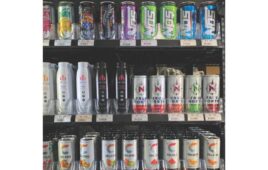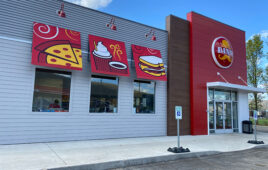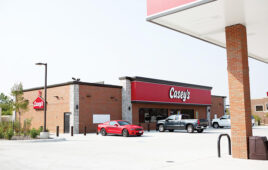If store cleanliness is becoming an overarching concept in convenience retailing, it’s imperative to an operation’s success that the concept of cleanliness extends to the restrooms.
By David Bennett Senior Editor
According to GasBuddy’s 2018 summer travel survey released this past May, 37% of respondents said that one of their worst fears is being unsure of where to stop for a clean restroom while on a road trip.
That’s probably why more people are turning to QuikTrip for peace of mind.
For the second consecutive year QuikTrip took top restroom honors in seven states in the latest ranking from GasBuddy. The Tulsa, Okla.-based convenience chain nabbed top honors in more states than any other c-store. Wawa came in second with the highest-rated restrooms in six states, followed by Chevron, Cumberland Farms, Kum & Go and Maverik each topping the list in three states.
Of course, the linkage between store cleanliness and quality foodservice is unmistakable. QuikTrip over the last several years has expanded its QT Kitchen concept in which customers can order made-to-order sandwiches, flatbreads, pizzas, pretzels, smoothies and coffee drinks. Just as unmistakable is that concept of cleanliness extends to a store’s restrooms, said Mike Thornbrugh, QuikTrip’s manager of public and government affairs.
“With more and more companies entering the fresh food offer, in our opinion, a clean, well-stocked restroom is extremely important,” Thornbrugh said.
QuikTrip operates more than 700 convenience stores across 11 states
QUITE THE EXPERIENCE
Jeffrey Nader, project director at api (+), a Tampa, Fla.-based architectural firm that specializes in retail design, said experience has become the gauge by which consumers retain brand loyalty. Factors such as ease of flow, customer service and fast check-out have become an integral part of the c-store shopping experience.
“Prior to the surge in digital connectedness, consumer expectation was generally driven by people’s preconceived ideas regarding goods and services; however, c-stores in recent years have expanded their digital footprint reaching a larger consumer base, thus creating a more competitive landscape for in-store experiences.,” Nader said. “Competition breeds innovation, and innovation has expanded the brand experience to encompass a c-store space that ranks highly in shaping customer satisfaction and that is the ‘branded restroom experience.’”
ADA MANDATES
While businesses are required to provide restroom facilities for their employees, not every business is required to allow customers to use these restrooms. If a company chooses to allow public access, they must ensure the facilities conform to local plumbing codes and to the Americans with Disabilities Act.
Nader said “accessibility” is an overarching concept that continues to challenge store designers, including the convenience channel.
“C-store brands that recognized the vast needs of the accessible landscape have set in place brand specific adjustments that build and expand on the Americans with Disabilities Act that was revised in 2010,” Nader said. “Such embellishments include more spacious stalls, in-stall informatics and communication technologies, and a new shift in robotic assistance to give more leverage and mobility.”
IN THE LOOP
Pervez Pir, chief operating officer of the Fremont, Calif.-based Loop Neighborhood convenience chain that is part of Vintners Distributors, said the progressive chain offers its customers a singular shopping experience, offering a variety of products including fresh organic fruits, customized salads, fresh sandwiches, sushi and even a wine station at many of its California locations.
The executive team behind Loop chose to highlight modern store design, featuring dramatic differences for customers—different from the usual convenience stores to which they are accustomed. From the moment patrons walk through the door to the moment they leave, c-stores customers are assessing core factors such value, quality, affordability—and cleanliness.
“Clean restrooms are very important in our business since c-stores saturate the landscape. We have hundreds of customers stopping by our locations to use the restroom and if we can give them a good experience they will also trust the food and other offerings. It shouldn’t be a choice but the standard,” Pir said.
Something that is a choice among c-store chains, but is becoming more a standard is the installation of modern restroom equipment that not only appeals to customers, but requires less maintenance and manpower to clean.
Loop, when designing a new store or remodeling an existing site within its 28-store chain, offers user-friendly urinals, hand dryers and automatic flushing toilets.
“We try to make sure the restroom is hands free or eco-friendly,” Pir said. “We know that people don’t like touching toilet flushers and towels dispensers, so why not make it automated so they get in and out. The more sanitary it is the more likely a customer is going to shop for food at our locations. Raising the bar on our cleanliness standards also tells the customer we have the same standards on our food offerings.”
QuikTrip’s Thornbrugh agreed that providing an inviting and sparkling restroom for customers is essential and a cornerstone of the chain’s service model.
“QT has always placed restroom cleanliness as critical to our overall success; nothing has changed that,” he said.
Hygiene Heads-Up
Since convenience stores are usually located in high-traffic areas, it’s important that customers and staff have easy access to hand hygiene and are encouraged to wash their hands. Recent survey results from Tork, a brand of Essity, a global hygiene and health company, highlight the importance of handwashing for creating a healthier environment for employees and customers alike. Among the findings:
• Implementing hand washing routines can increase customer loyalty. Noticing that store employees have clear routines for hand washing makes almost one in two (47%) more willing to eat there again.
• Clean hands can increase well-being of people around you. If everyone washed their hands properly, people would feel: 1) more comfortable (43%); 2) more secure (34%); 3) more satisfied (31%); and 4) happier (23%).
• Implementing hand washing routines can boost employee satisfaction. Knowing that everyone at work washes their hands properly would have a positive impact on the well-being of almost eight in 10 full-time employees.




